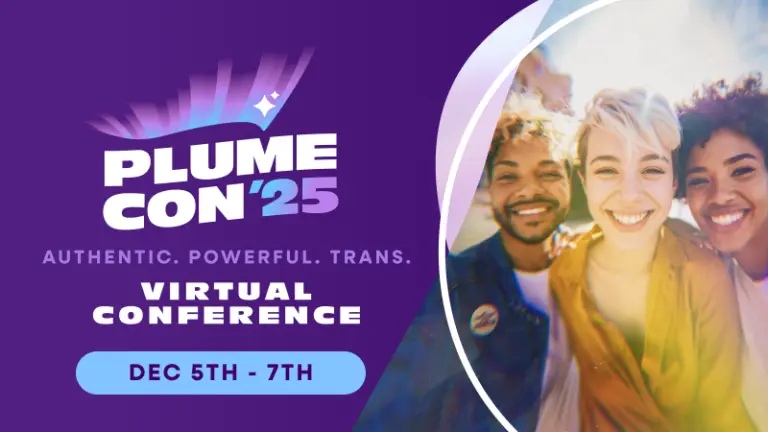Being a trans or non-binary person can, for some, be a lonely and isolating experience. If you have ever felt that way on your gender journey, you’re not alone! Studies show that loneliness is much more common among LGBTQ+ individuals compared to those who identify as straight or cisgender. For example, about 41% of gay adults, 45% of lesbian adults, and nearly 57% of bisexual adults experience loneliness, compared to 30% of straight adults. The numbers are even higher for trans folks—over 56% of trans women, 63% of trans men, and nearly 64% of non-binary or gender non-conforming people report feeling lonely. On top of that, many LGBTQ+ individuals, especially trans people, also struggle with a lack of social and emotional support.
We know that there is power in community connection, especially for trans and non-binary people. That’s why we created spaces like the Plume Community Hub, a space where trans and non-binary folks can connect with each other, share stories, and find the support all us trans people deserve. Studies show that social support is a crucial factor in reducing mental health issues such as depression and anxiety in transgender people . The study found that trans people who had strong social support networks were less likely to experience suicidal ideation and were better equipped to cope with stress and discrimination.
Why is community important to trans people?
A community is more than just a group of people living in the same geographic location; it is a collective of individuals who share common values, experiences, or goals. For trans people, community provides a sense of belonging and support, which is especially important for those who may feel marginalized or isolated in society. Within a trans community, we can find empathy, acceptance, and affirmation, all of which are important for our mental and emotional well-being.
For the trans community, a sense of belonging can come from connecting with others who share similar experiences of gender identity and expression. This connection allows individuals to feel understood, validated, and supported in ways that might not be possible in the broader society. Communities can form around various aspects of life, including shared identities, interests, professions, or goals. In the context of trans health, these communities often provide essential support, resources, and advocacy.
Building a network of support can also help trans individuals combat feelings of loneliness and isolation, which are prevalent in the community. Trans people are at a higher risk of experiencing social isolation due to factors such as rejection from family and friends, societal stigma, and discrimination. But when we are connected to a supportive community, we are more likely to experience a sense of belonging, which can significantly reduce feelings of isolation. Not only do we feel less lonely, we have a network of resources and shared knowledge within our reach from some of the people who relate to us the most.
How To Find Community As a Trans Person
Building and sustaining trans communities requires intentional effort and commitment. While it may seem daunting, the rewards are immeasurable – we are healthier, happier, and stronger together.. For trans people, here are some ways to start fostering strong community connections:
- Support Groups: Support groups, both in-person and online, provide a safe space for trans individuals to share their experiences, offer mutual support, and build connections. Support groups can be organized around specific topics, such as mental health, legal issues, or medical transition, or they can be more general in nature.
- Community Events: Hosting or attending community events (in-person or online), such as pride celebrations, workshops, or social gatherings, can help bring you together with other trans people and strengthen bonds. These events create opportunities for connection, learning, and celebration of shared identities.
- Online Communities: The internet has made it easier than ever for trans people to connect with others who share their experiences. Online forums, social media groups, and websites dedicated to trans issues provide valuable platforms for discussion, support, and resource sharing.
- Advocacy and Activism: Participating in advocacy and activism can help strengthen community connections while also working toward social change. Whether it’s through organizing events, participating in protests, or engaging in political advocacy, these activities can bring people together and create a sense of solidarity.
Community connections can be a lifeline for trans folks. When we come together to create and support these communities, we empower each other to face challenges and thrive. As we continue to build and nurture these communities, it is essential to remember that everyone has a role to play. Whether you’re a trans person seeking connection, an ally offering support, or an organization working to create inclusive spaces, your efforts contribute to the strength and resilience of the trans community. Together, we can create a world where every trans person feels a sense of belonging and support.
Plume Members: You can join the Plume Community Hub, included with your membership. Join to participate in all the community and support programs Plume has to offer. Connect with other trans folks and access our trans-focused programming all in one place. Chat in the discussion space, attend virtual events, join a peer-support group, or learn from our transition resources. Read our FAQ for more info about how to get started in the Plume Community Hub.




